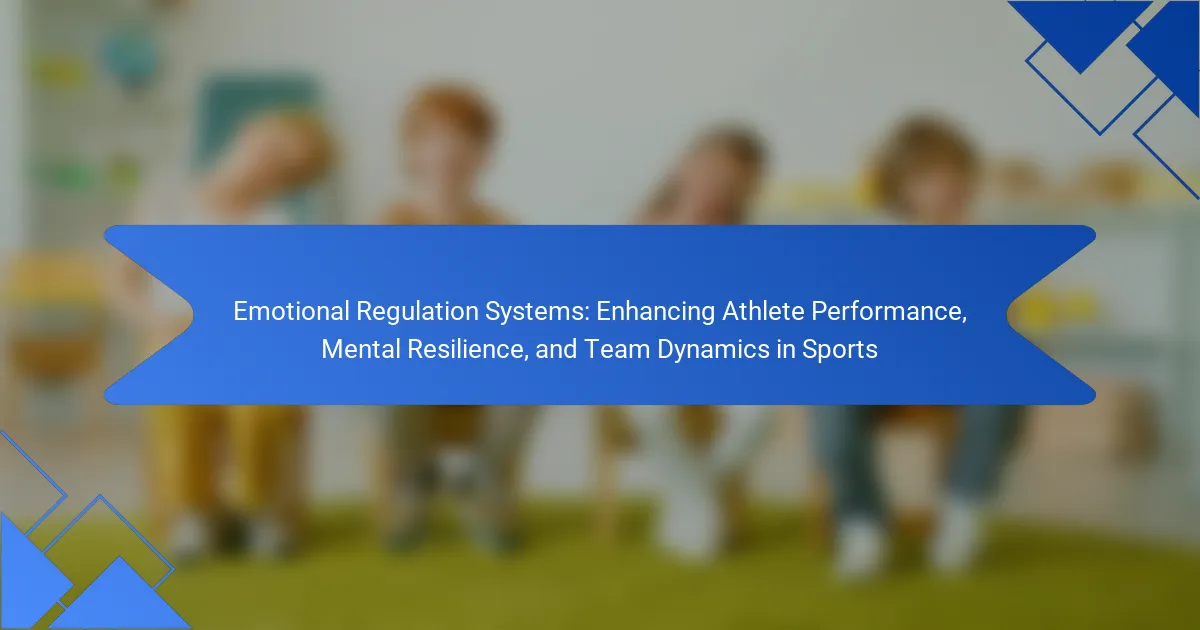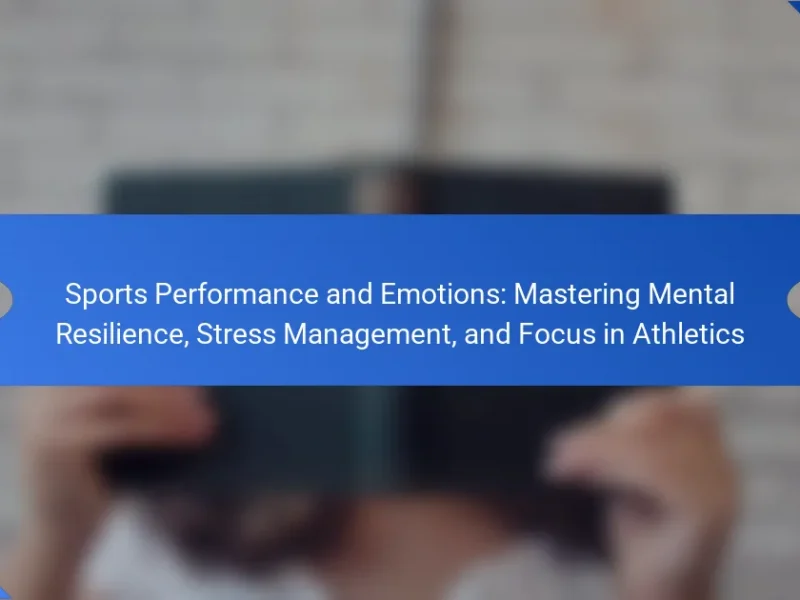Emotional regulation systems significantly enhance athlete performance and mental resilience while improving team dynamics. These systems utilize emotional awareness, cognitive appraisal, and coping strategies to help athletes manage their emotions effectively. Additionally, integrating real-time feedback and tailored interventions fosters better decision-making under pressure. Coaches can implement these strategies through structured training and open communication, creating a supportive environment for athletes.
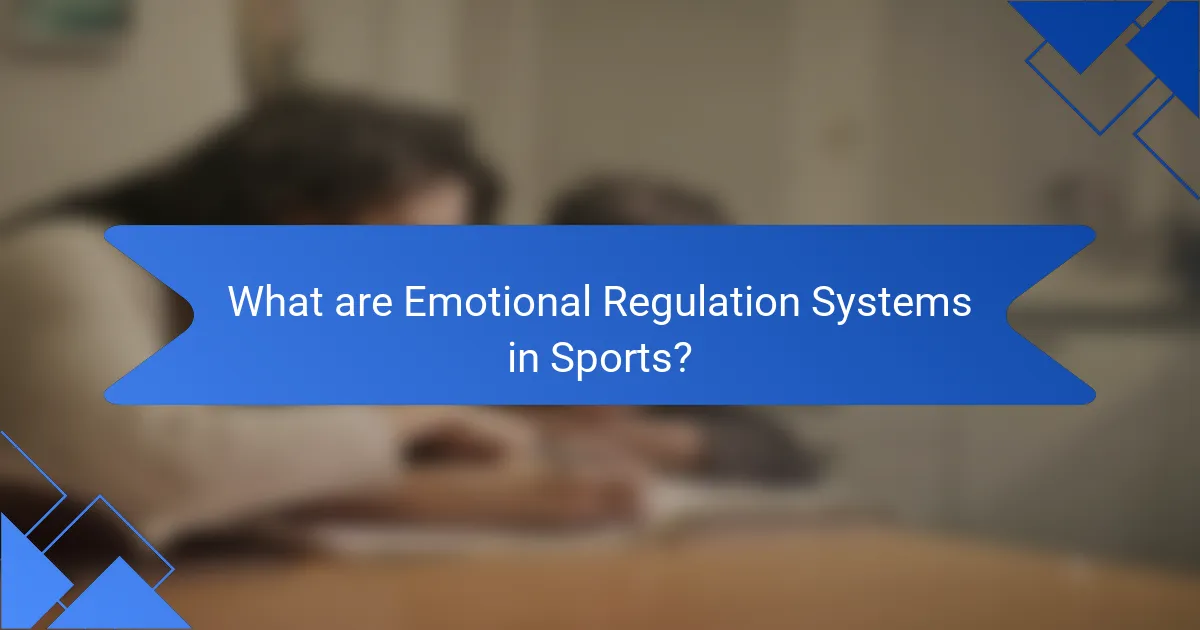
What are Emotional Regulation Systems in Sports?
Emotional regulation systems in sports are strategies that enhance athlete performance, mental resilience, and team dynamics. These systems help athletes manage their emotions effectively, leading to improved focus and decision-making during competitions. For example, techniques such as mindfulness and cognitive restructuring allow athletes to maintain composure under pressure. Research indicates that athletes with strong emotional regulation skills experience lower anxiety levels and higher overall satisfaction in their sport. As a result, these systems foster better communication and collaboration within teams, ultimately enhancing performance outcomes.
How do Emotional Regulation Systems impact athlete performance?
Emotional regulation systems significantly enhance athlete performance by promoting mental resilience and improving team dynamics. These systems help athletes manage stress, maintain focus, and recover from setbacks. Effective emotional regulation leads to better decision-making and increased motivation during competitions. Research indicates that athletes with strong emotional regulation skills perform consistently better under pressure, resulting in improved outcomes. Additionally, these systems foster positive team interactions, contributing to a cohesive and supportive environment essential for success in sports.
What role does emotional regulation play in mental resilience?
Emotional regulation significantly enhances mental resilience by helping athletes manage stress and maintain focus. Effective emotional regulation allows athletes to respond constructively to challenges, improving performance under pressure. Research indicates that athletes with strong emotional regulation skills exhibit better coping strategies, leading to increased resilience and improved team dynamics. This ability to regulate emotions can be a unique attribute that distinguishes high-performing athletes from their peers.
How can emotional regulation enhance team dynamics?
Emotional regulation enhances team dynamics by fostering better communication and collaboration. When athletes manage their emotions, they contribute to a positive atmosphere, reducing conflicts and improving trust. This leads to heightened mental resilience, allowing teams to navigate challenges effectively. Research indicates that emotionally regulated teams perform better under pressure, demonstrating increased cohesion and support for one another. Ultimately, this creates an environment conducive to achieving collective goals and enhancing overall performance.
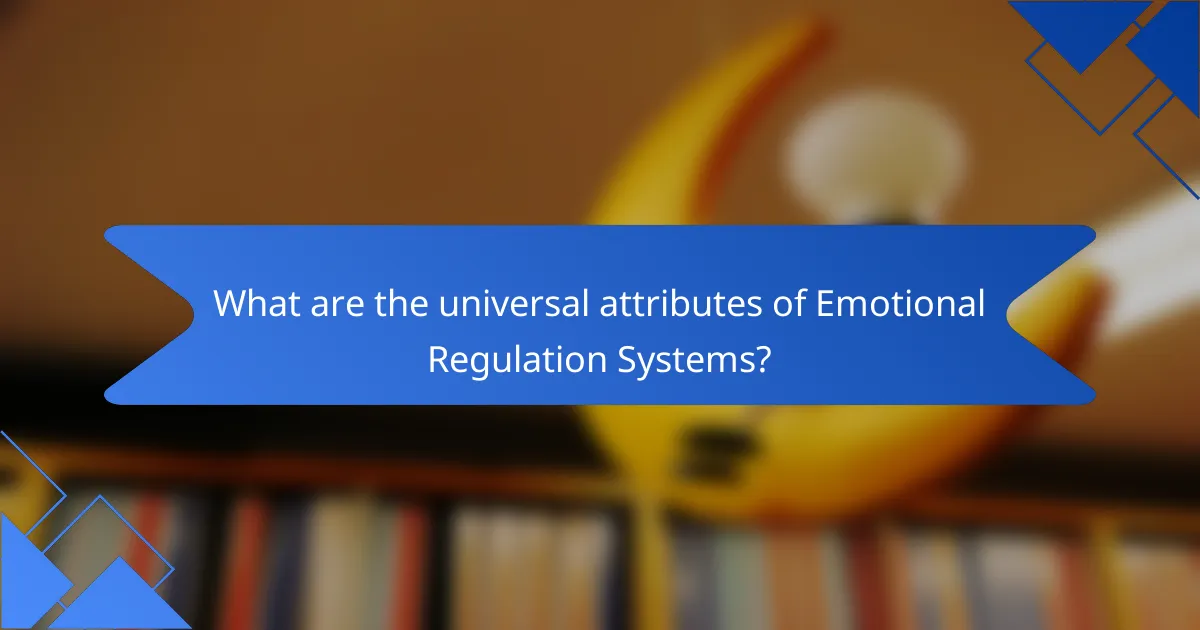
What are the universal attributes of Emotional Regulation Systems?
Emotional Regulation Systems enhance athlete performance through key universal attributes. These include emotional awareness, cognitive appraisal, coping strategies, physiological regulation, and interpersonal skills. Each attribute plays a crucial role in managing emotions effectively, leading to improved mental resilience and team dynamics. Emotional awareness allows athletes to recognize and understand their emotions. Cognitive appraisal enables them to interpret emotions constructively. Coping strategies provide tools for managing stress and anxiety. Physiological regulation helps in controlling bodily responses to emotions. Interpersonal skills foster effective communication and collaboration within teams.
How do Emotional Regulation Systems contribute to stress management?
Emotional Regulation Systems significantly enhance stress management by promoting adaptive coping strategies. These systems help athletes process emotions, reducing anxiety and improving focus during competition. Effective emotional regulation fosters mental resilience, enabling athletes to maintain composure under pressure. As a result, teams benefit from improved dynamics and collective performance. Studies show that athletes with strong emotional regulation skills experience lower stress levels and higher overall satisfaction in their sport.
What techniques are commonly used in emotional regulation?
Emotional regulation techniques commonly used in sports include cognitive reappraisal, mindfulness, and relaxation strategies. Cognitive reappraisal involves reframing thoughts to alter emotional responses, enhancing mental resilience. Mindfulness practices increase self-awareness, allowing athletes to manage emotions effectively. Relaxation techniques, such as deep breathing and progressive muscle relaxation, reduce anxiety and improve focus. These methods collectively enhance athlete performance and team dynamics.

What unique attributes set Emotional Regulation Systems apart?
Emotional Regulation Systems are distinguished by their integration of psychological strategies, real-time feedback mechanisms, and tailored interventions. These unique attributes enhance athlete performance by fostering mental resilience and improving team dynamics. Real-time feedback enables athletes to adjust their emotional responses during competition, leading to better decision-making. Tailored interventions address individual emotional needs, promoting optimal performance under pressure. These systems also incorporate mindfulness practices, which are rare in traditional training programs, further setting them apart.
How does individual personality affect emotional regulation strategies?
Individual personality significantly influences emotional regulation strategies. Athletes with high emotional intelligence tend to employ adaptive strategies, enhancing performance and mental resilience. In contrast, those with lower emotional awareness may resort to maladaptive methods, negatively impacting team dynamics. Understanding these personality traits allows coaches to tailor emotional regulation training, fostering a more cohesive team environment.
What are the unique challenges faced by athletes in emotional regulation?
Athletes face unique challenges in emotional regulation, impacting performance and team dynamics. High-pressure environments trigger stress responses, leading to anxiety and decreased focus. Additionally, the stigma around mental health in sports often prevents athletes from seeking help. Emotional regulation strategies must be tailored to individual needs, as athletes differ in coping mechanisms. Understanding these challenges is crucial for enhancing mental resilience and overall performance.
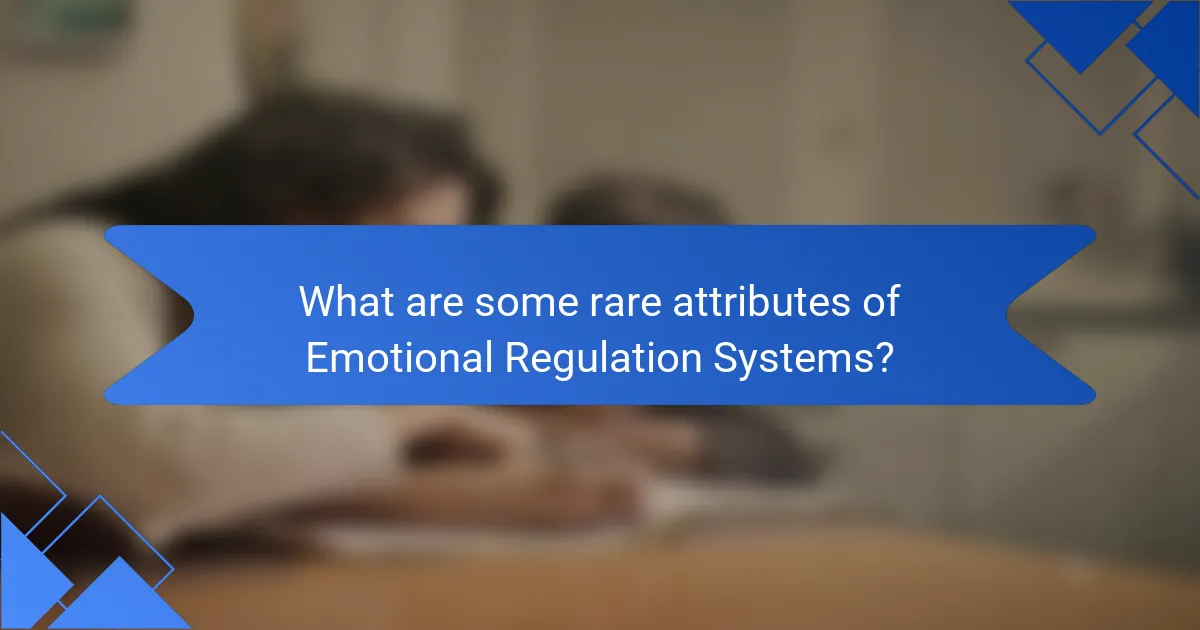
What are some rare attributes of Emotional Regulation Systems?
Emotional Regulation Systems can exhibit rare attributes that significantly influence athletic performance. One rare attribute is the integration of biofeedback mechanisms, allowing athletes to monitor physiological responses in real-time. Another rare attribute is the application of mindfulness techniques tailored specifically for high-pressure sports environments. These systems can also include personalized emotional mapping, which identifies unique emotional triggers for each athlete, enhancing self-awareness and control. Lastly, the incorporation of advanced technology, such as virtual reality simulations for emotional training, represents a cutting-edge approach in this field.
How do cultural differences influence emotional regulation in sports?
Cultural differences significantly impact emotional regulation in sports by shaping athletes’ responses to stress and competition. These variations influence how emotions are expressed and managed within teams. For instance, collectivist cultures may prioritize harmony, leading athletes to suppress individual emotions for team cohesion, while individualist cultures might encourage open expression of feelings, promoting personal resilience. Understanding these dynamics enhances mental resilience and team dynamics, ultimately improving athlete performance.
What are the implications of emotional regulation on long-term athlete development?
Emotional regulation significantly influences long-term athlete development by enhancing performance, resilience, and team dynamics. Effective emotional management leads to improved focus, decision-making, and stress handling during competitions. Athletes with strong emotional regulation skills demonstrate greater persistence and adaptability, crucial for overcoming challenges and setbacks. This ability fosters a positive team environment, promoting collaboration and communication among athletes. As a result, the overall development trajectory of athletes is positively impacted, leading to sustained success in their sports careers.
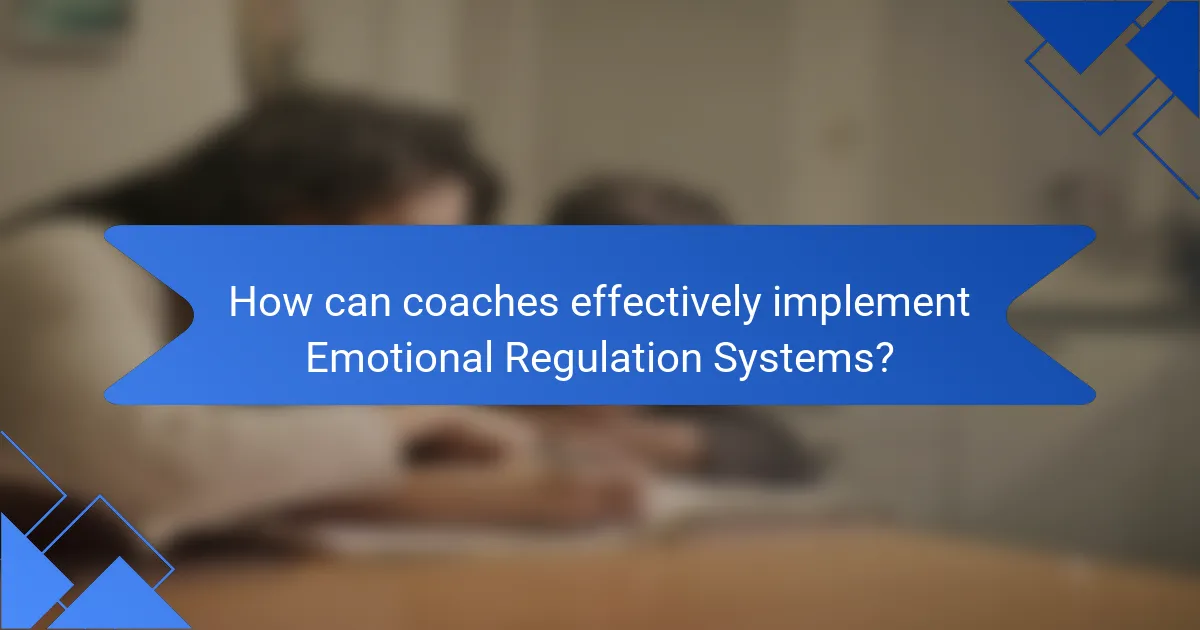
How can coaches effectively implement Emotional Regulation Systems?
Coaches can effectively implement Emotional Regulation Systems by integrating structured training, fostering open communication, and utilizing feedback mechanisms. These systems enhance athlete performance, mental resilience, and team dynamics.
Structured training involves teaching athletes specific techniques for emotional awareness and regulation. For example, mindfulness practices can help athletes recognize and manage their emotions during competition.
Open communication creates an environment where athletes feel safe to express their feelings. This fosters trust and encourages team cohesion, essential for collective performance.
Feedback mechanisms allow coaches to assess emotional regulation progress. Regular check-ins and evaluations help athletes understand their emotional responses and improve their coping strategies.
By prioritizing these strategies, coaches can create a supportive atmosphere that enhances overall athletic performance and well-being.
What training programs exist for enhancing emotional regulation skills?
Training programs for enhancing emotional regulation skills include mindfulness training, cognitive-behavioral therapy (CBT), and emotion-focused therapy. These programs help athletes manage stress, improve focus, and enhance team dynamics. Mindfulness training promotes awareness and acceptance of emotions, while CBT develops coping strategies. Emotion-focused therapy addresses emotional experiences to foster resilience. Each program uniquely contributes to athlete performance by improving mental resilience and team cohesion.
How can technology assist in emotional regulation for athletes?
Technology enhances emotional regulation for athletes by providing tools for monitoring, feedback, and interventions. Wearable devices track physiological indicators like heart rate and stress levels, enabling athletes to understand their emotional states. Apps offer mindfulness and breathing exercises, fostering mental resilience. Virtual reality simulations create controlled environments for practicing emotional responses, improving team dynamics. These innovations support athletes in managing emotions effectively, leading to better performance outcomes.
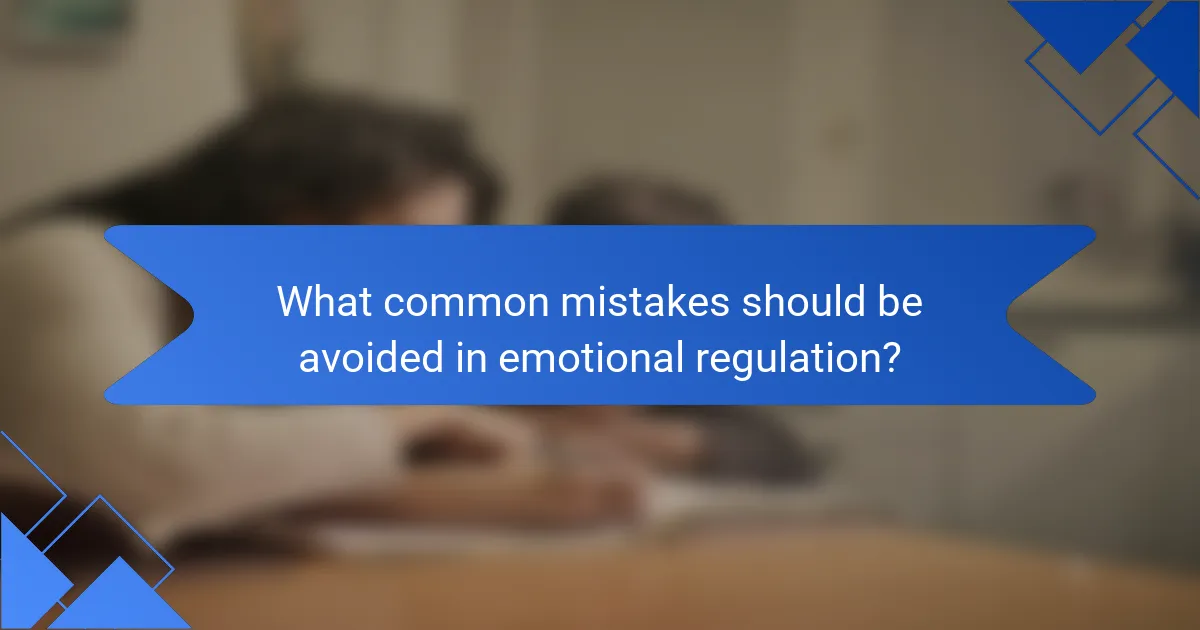
What common mistakes should be avoided in emotional regulation?
To enhance emotional regulation, athletes should avoid common mistakes like neglecting self-awareness, failing to practice regularly, and using ineffective coping strategies. Recognizing emotions is vital for mental resilience. Regular practice of emotional regulation techniques fosters better performance. Ineffective coping strategies can lead to increased stress and decreased team dynamics.
What best practices can enhance emotional regulation in sports?
Emotional regulation in sports can be enhanced through targeted practices that improve athlete performance and team dynamics. These best practices include mindfulness training, cognitive restructuring, emotional awareness exercises, and routine emotional check-ins.
Mindfulness training helps athletes stay present, reducing anxiety and enhancing focus. Cognitive restructuring encourages athletes to challenge negative thoughts, fostering a positive mindset. Emotional awareness exercises promote recognition of feelings, facilitating better responses. Routine emotional check-ins establish a culture of open communication, strengthening team cohesion.
Implementing these practices can lead to improved mental resilience and overall performance in competitive environments.
How can athletes self-assess their emotional regulation effectiveness?
Athletes can self-assess their emotional regulation effectiveness by reflecting on their reactions during competitions. They should evaluate their ability to maintain composure, manage stress, and recover from setbacks. Key indicators include consistency in performance, response to adversity, and interactions with teammates. Tracking these aspects over time can reveal patterns and areas for improvement. Engaging in regular mindfulness practices can also enhance self-awareness and emotional control.
What steps can be taken to improve emotional awareness?
To improve emotional awareness, athletes can engage in self-reflection, mindfulness practices, and open communication. These steps enhance emotional regulation systems, boosting performance and team dynamics. Regularly assessing emotions helps identify triggers, while mindfulness fosters present-moment awareness. Open communication encourages sharing feelings, promoting mental resilience and team cohesion.
How can feedback loops optimize emotional regulation strategies?
Feedback loops enhance emotional regulation strategies by allowing athletes to assess their emotional responses and adjust behaviors in real-time. This iterative process fosters mental resilience and improves performance. Regular feedback helps identify emotional triggers and effective coping mechanisms, promoting better team dynamics. Studies show that athletes who utilize feedback loops experience increased self-awareness and emotional control, leading to improved outcomes in high-pressure situations.
